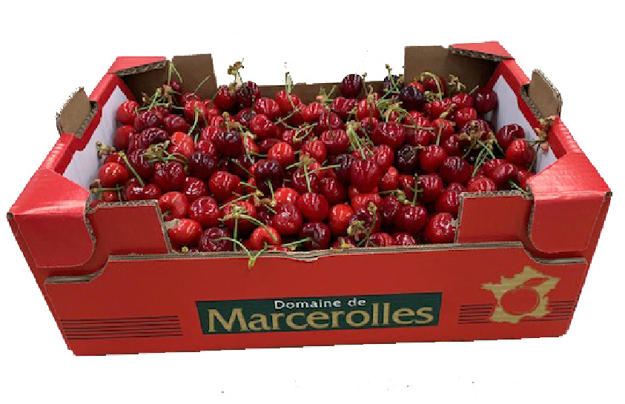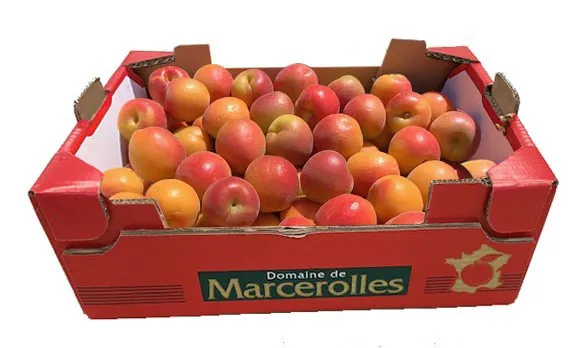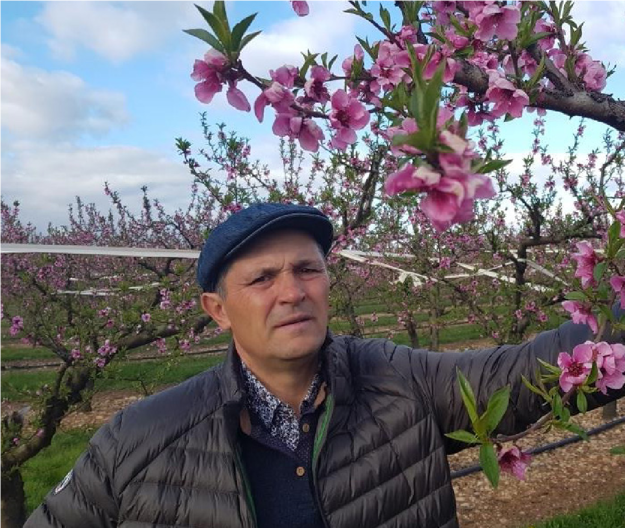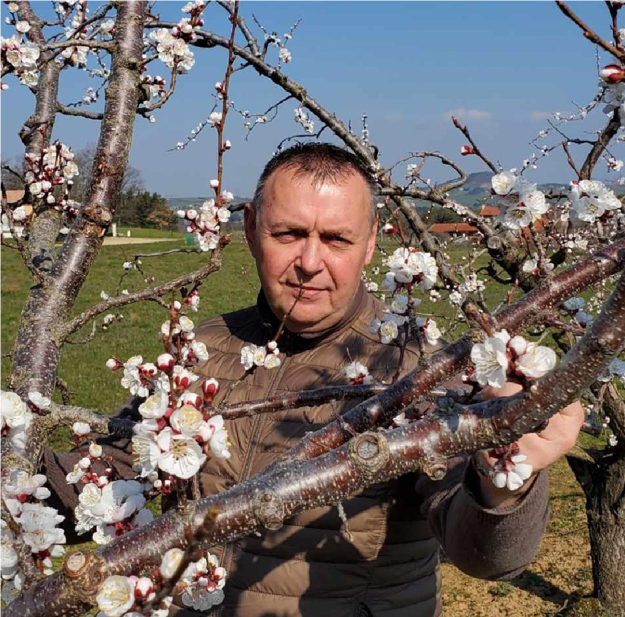After wheat, barley, milk, meat, eggs, honey, dried vegetables and condiments, fruit are now also part of the Agri-Ethique approach, the first French fair trade label. This initiative is led by Le Domaine de Marcerolles, a brand located in southeastern France. Starting in May, cherries, apricots, peaches, nectarines and pears will be stamped with this increasingly popular label.
Recognizable by their red packaging, the fruit of Le Domaine de Marcerolles have been a pleasure for consumers and the pride of producers of the Gard, Drôme and Ardèche departments for over 20 years. 35 of the producers came together in 2019 to form an association, “Les Amis du Domaine de Marcerolles”, in order to pool their productions and therefore meet the expectations of their clients. To develop new outlets and ensure a fair payment for their work, the association decided to join the Agri-Ethique label. “We are proud to support this sector, which is structured around motivated arboriculturists with virtuous practices, in line with our specifications,” explains Ludovic Brindejonc, director of Agri-Ethique, the first French fair trade label.
Virtuous and valued practices
“It seemed obvious to us to get closer to the Agri-Ethique label,” explains Frédéric Aberlenc, head of the Domaine de Marcerolles office. “Our niche is quality, respect for the producers and their work. We favor the orchards planted on hillsides, with older varieties of incomparable taste qualities.” Another characteristic of the producers of the association is that they are almost all certified HEV, the highest level of environmental certification. Environmentally-friendly practices are already part of the DNA of these producers. “Agri-Ethique will enable us to value these efforts economically and capitalize on our notoriety in order to develop new market sectors.”

Le Domaine de Marcerolles has committed to at least 1,000 tons of fruit for 2021
For the producers, the challenge is to ensure the profitability of their productions, via remunerative prices defined by three-year contracts. For 2021, Le Domaine de Marcerolles has committed to at least 1,000 tons of fruit. The commitment with Agri-Ethique concerns 8 of the 35 producers of the association. Laurent Clut is one of them. “As the president of the association, it seemed obvious to me to be among the first. We hope to quickly expand the offer to the rest of our producers and eventually cover all the productions on our farms. The societal demand keeps growing for local, virtuous, quality products. The Agri-Ethique label will enable us to meet these expectations.”

“Agri-Ethique, a fair remuneration of our work”
Jointly running 105 hectares with his son in Châteauneuf-sur-Isère (Drôme), Laurent Clut is committed to supplying cherries, apricots and peaches with the Agri-Ethique label this spring. “I like the foundations of this approach. Taking into account production costs to define contract prices is, according to me, the best tool to ensure fairness between each partner of the sector. Over the years, negotiations have become increasingly complicated. It is sometimes difficult to make our production costs profitable: labor, which is not easy to find in our region, is very costly. Joining Agri-Ethique guarantees remunerative prices for us over several years, which truly gives us security. The values of this label immediately appealed to me: respect of people, products, land, environment...I would like the consumers, by their act of purchase, to choose not only for taste and proximity, but also to participate as citizens in the fair remuneration of our work. I believe this would show a true recognition of our profession.”
 Laurent Clut, producer and president of the association
Laurent Clut, producer and president of the association
“Differentiating ourselves from the competition”
“The first 8 producers of the association to join the Agri-Ethique label are complementary in terms of their productions and geographical location. The ripening dates of the different varieties are spread out, so we will be able to supply our clients for a longer period: from end of April until end of July for the cherry, from May 20th to September 1st for the apricot, June 10th to September 15th for peaches and nectarines, and from July 14th for the pear. Thanks to Agri-Ethique, we hope to strengthen our commercial position by differentiating ourselves from the competition. We hope to be able to offer our merchandise to supermarkets and restaurants very soon. The trust between partners, the transparency, the social and societal aspect of the label...so many arguments to promote in order to seduce them.”
 Frédéric Aberlenc, head of the Domaine de Marcerolles office
Frédéric Aberlenc, head of the Domaine de Marcerolles office
“Agri-Ethique, more than a label”
Eight years after its launch, the Agri-Ethique label is now found on more than 235 products, from 1,536 farms. All of these products carry the values of fair trade: fair remuneration of the producers, preserving local jobs, supporting societal and environmentally-friendly practices. Agri-Ethique is a commercial partnership between all actors of the sector. It is built on contracts of at least three years and founded on dialogue, transparency and respect. Solidarity between sectors is also part of the foundation of Agri-Ethique.
dialogue, transparency and respect. Solidarity between sectors is also part of the foundation of Agri-Ethique.
On the right: Ludovic Brindejonc, general manager of Agri-Ethique
A tool to ensure agro-ecological transition
With this label, we also want to raise awareness among consumers who, by their act of purchase, participate in the deployment of fair trade in their region. Each partner contributes to a collective fund associated with the sector in order to carry out various actions based on the needs of each region: animal welfare, preserving biodiversity, technical and financial support of farmers…. The Agri-Ethique label is a real tool to ensure agro-ecological transition in agriculture.
For more information:
Agri-Ethique
www.agriethique.fr
